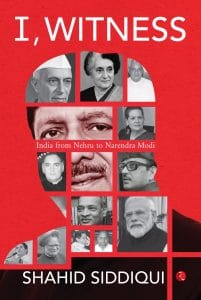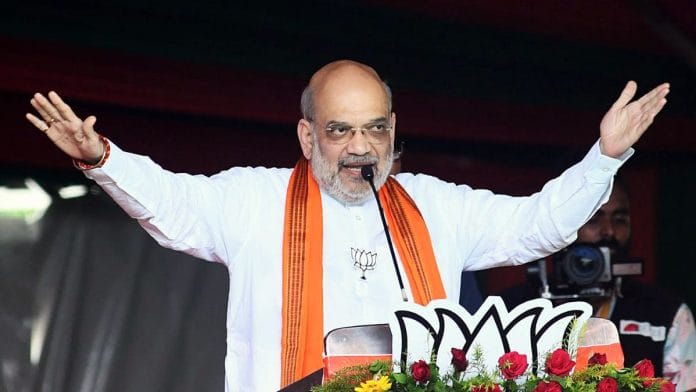One evening in January 2014, my friend Piyush Goyal called to invite me to his house for breakfast. He wanted me to meet Narendra Modi’s right-hand man, Amit Shah. I was surprised and asked him why he wanted to meet me. Piyush laughed and said he had a special message for me from Prime Minister Modi. I was curious as I had never met Amit Shah, even though I had met Modi again after my interview in 2012.
The next day, on a foggy Delhi morning, I reached his house on Humayun Road. Amit Shah was already there. While Piyush is in the habit of smiling broadly all the time, Amit Shah hardly ever smiles. He appeared to have intense, cold eyes, and a soft, round, expressionless face that revealed no emotion. One couldn’t read his mind or his responses from his face or his eyes. They seemed so different from one another in terms of their attitude.
While enjoying a hot Mumbaiya breakfast on a cold Delhi morning, we discussed national politics and the issues before the nation. Amit Shah asked me what I thought of the approaching general elections and the scope for the BJP’s victory. I honestly told him that in UP, where I was travelling extensively, especially the rural areas, I could see a Modi wave—unlike anything I had ever seen in the past. But still, I believed that the BJP would remain short of a majority. No party had had a clear majority since 1984, when the Congress, under Rajiv Gandhi, swept the polls.
Amit Shah didn’t beat around the bush and came straight to the point, as was his forte. He said that Modi had asked him to bring me into the party fold. He had spoken to BJP president Rajnath Singh, and they wanted me to join the party the next day, at a press conference at the party office. It didn’t surprise me as I had discussed this issue with Modi a few months ago in Gandhinagar. I told Shah that I would have to think about it and consult my supporters before taking any decision. He seemed disappointed as he was not in the habit of hearing a no. He expected people to follow his command without thinking.
I wanted to know what the BJP’s policies would be vis-à-vis Indian Muslims. Shah was sincere and straightforward. He said that they were not interested in Muslim votes, and would think about them only a few years later. I will never forget one of his observations. It was: ‘Elections are won or lost on sentiments, not good work. If good work were the criterion, Sheila Dikshit would never have lost. But in Delhi, sentiments were against her despite her outstanding work.’
As a master of winning elections, his priorities were evident.
Also read: Becoming Hindu is not the same as being Hindu. It’s not fashionable
For a long time, I have believed that Indian Muslims should not close their options, and that they should join every political party depending on their ideological preferences. I was not averse to joining the BJP at that point. I believed that if Modi became the prime minister, he would change, just as Vajpayee had. However, I still did not agree with the BJP on several issues, so I declined the offer.
In hindsight, after looking at Prime Minister Modi’s two terms, I have no regrets, as I see that those who joined the party, or those like Mukhtar Abbas Naqvi or Shahnawaz Hussain who were there for many years, have mostly been sidelined. Today, I meet several Muslims who say that they want to join the BJP; they believe that so far as the treatment of Muslims is concerned, there is no difference between the so-called secular parties and a party subscribing to Hindutva. But they bemoan the fact that not only does the BJP seem uninterested in giving even a token representation to Muslims, but they are also apathetic about getting their votes.
The truth is that in the last decade, Prime Minister Modi has succeeded in giving the country a stable government and economy. An Aadhaar-based delivery system initiated by Manmohan Singh but implemented by Modi has brought relief and a certain degree of prosperity to the poorest of the poor.
The Pradhan Mantri Awas Yojana provided shelter to millions of people for the first time. The digitalization of services brought technology and services closer even to those living on society’s margins. With all its shortcomings, the Pradhan Mantri Ujwalla Yojana and free LPG brought relief to poor women.
he Pradhan Mantri Jan Dhan Yojana introduced a banking system to crores of Indians. Above all, what touched my heart, and something I had been promoting for some time, was the Swachh Bharat Mission, through which nearly ten crore toilets were built, giving rural women both relief and freedom.
Some of these schemes were impacted by corruption and tardy implementation. Still, while visiting Muslim-dominated villages of Muzaffarnagar, Bijnore, Meerut and large parts of western UP, I hardly came across any discrimination based on religion or caste.
During the Lok Sabha and Assembly elections, when I learnt that Muslims had voted for the BJP in certain villages, I enquired about it and discovered that they were beneficiaries of some of these schemes. Whatever Modi’s opponents may say, these schemes have improved the lives of the poor and marginalized sections of society, and so they have voted for him in the last three general elections.
Today, Prime Minister Modi’s aura is much larger than that of the BJP. People neither vote for a candidate nor for the BJP, but for Modi. In the 70s, it was said that if Indira Gandhi put up a lamppost in the elections, it would have won. It’s the same situation today. Modi has succeeded in turning the parliamentary election into a presidential one—where people don’t just vote for a party or its candidate but the prime minister. No one can stand up to him in this battle of personalities.
After Vajpayee, the BJP lacked a strong personality to stand up to the Gandhi-Nehru parivar. They didn’t have leaders like Lalu, Mulayam Singh, or Mayawati. Modi understood this and systematically built a cult of a larger-than-life personality around himself. This would not bow before any superpower, but make India into one; every nation will have to bow before it. He has successfully made his supporters believe that before 2014 India was a backward nation and the whole world looked down on it, but with the emergence of Modi, all that has changed. This ability to dwarf every other Indian leader before him is his most significant accomplishment.
Unlike Vajpayee, Modi did not dilute his hard-line Hindutva; in fact, it has become more stringent as time has passed. But the way he has combined Hindutva with socialism and schemes for the poor has delivered him victory after victory in Lok Sabha as well as state elections.
 This excerpt from Shahid Siddiqui’s ‘I, Witness: India from Nehru to Modi’ has been published with permission from Rupa Publications.
This excerpt from Shahid Siddiqui’s ‘I, Witness: India from Nehru to Modi’ has been published with permission from Rupa Publications.






